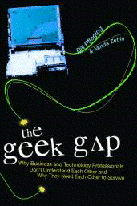Gridlock v. Gridlock
One summer when I was in college, my boyfriend and I were walking home with my father from his 57th Street office. Along the way, we stopped into a drugstore for a few household items.
When we went into the drugstore, Midtown traffic was inching along, like on any other Friday afternoon in summer. When we emerged from the drugstore, less than ten minutes later, everything had come to a complete standstill. Drivers had turned off their engines. As far as we could see looking up and down Eighth Avenue, and across 60th Street, the streets were filled with cars that were simply parked where they sat.
The city had already begun using the term "gridlock" to refer to something its planners were worried about: the possibility that some relatively minor blockage could bring all traffic in the grid that is Manhattan to a halt. No one had seen the concept in action (perhaps I should say inaction) until that day. We walked the ten blocks home and saw traffic moving--slightly--at only one intersection, near Lincoln Center, where a squad of traffic cops was doing its very best to move things as quickly as possible. Everywhere else, the cars were simply frozen in place. What had caused all this, we found out on the news that night, was one brief bridge closure resulting from a chemical leak in a single truck. It was an object lesson in how fragile New York City can be.
"Gridlock" came to be used to refer to political immobilization as well, the kind that happen when Democrats and Republicans decide to dig in their heels rather than deal with a problem that needs solving. Such as the problem of global warming, and our dependence on a dwindling supply of fossil fuels, both of which are worsened when cars sit in traffic for hours, inching toward their destinations, as happens every day in Manhattan.
New York's mayor Michael Bloomberg proposed a "congestion tax" of $8 for cars and $21 for trucks that head into the busy heart of Manhattan (below 86th Street) during the workday. The idea would be to dramatically ease traffic in this part of town--which it undoubtedly would. But the plan was killed by the second kind of gridlock, as Democrats, displeased with Bloobmerg's past actions, all got together to stall the proposal till a deadline for federal aid for such initiatives had passed. Then they got together to discuss their own alternative proposal--which looks like it will include a "congestion pricing" initiative similar to what Bloomberg suggested.
The most benign interpretation is that these suits let their emotional need to exert their people-influencing skills override the problem-solving need that was in front of them. A more sinister interpretation would be that some wealthy corporations with a vested interested in having as many cars on the road burning as much oil as possible somehow exerted their own influence over the proceedings.
Of course, there's no way to know for sure. Meanwhile, the traffic on Eighth Avenue inches on.
When we went into the drugstore, Midtown traffic was inching along, like on any other Friday afternoon in summer. When we emerged from the drugstore, less than ten minutes later, everything had come to a complete standstill. Drivers had turned off their engines. As far as we could see looking up and down Eighth Avenue, and across 60th Street, the streets were filled with cars that were simply parked where they sat.
The city had already begun using the term "gridlock" to refer to something its planners were worried about: the possibility that some relatively minor blockage could bring all traffic in the grid that is Manhattan to a halt. No one had seen the concept in action (perhaps I should say inaction) until that day. We walked the ten blocks home and saw traffic moving--slightly--at only one intersection, near Lincoln Center, where a squad of traffic cops was doing its very best to move things as quickly as possible. Everywhere else, the cars were simply frozen in place. What had caused all this, we found out on the news that night, was one brief bridge closure resulting from a chemical leak in a single truck. It was an object lesson in how fragile New York City can be.
"Gridlock" came to be used to refer to political immobilization as well, the kind that happen when Democrats and Republicans decide to dig in their heels rather than deal with a problem that needs solving. Such as the problem of global warming, and our dependence on a dwindling supply of fossil fuels, both of which are worsened when cars sit in traffic for hours, inching toward their destinations, as happens every day in Manhattan.
New York's mayor Michael Bloomberg proposed a "congestion tax" of $8 for cars and $21 for trucks that head into the busy heart of Manhattan (below 86th Street) during the workday. The idea would be to dramatically ease traffic in this part of town--which it undoubtedly would. But the plan was killed by the second kind of gridlock, as Democrats, displeased with Bloobmerg's past actions, all got together to stall the proposal till a deadline for federal aid for such initiatives had passed. Then they got together to discuss their own alternative proposal--which looks like it will include a "congestion pricing" initiative similar to what Bloomberg suggested.
The most benign interpretation is that these suits let their emotional need to exert their people-influencing skills override the problem-solving need that was in front of them. A more sinister interpretation would be that some wealthy corporations with a vested interested in having as many cars on the road burning as much oil as possible somehow exerted their own influence over the proceedings.
Of course, there's no way to know for sure. Meanwhile, the traffic on Eighth Avenue inches on.



0 Comments:
Post a Comment
Subscribe to Post Comments [Atom]
<< Home